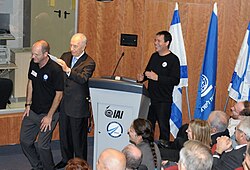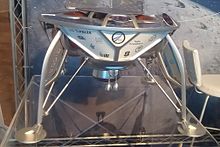SpaceIL

SpaceIL[1] is an Israeli nonprofit organization competing in the Google Lunar X Prize (GLXP) to land a spacecraft on the Moon in 2017.[2] SpaceIL aims to launch the smallest and lightest vehicle to ever land on the Moon.[3] Its total budget is estimated at US$36 million, provided mainly by philanthropists.
SpaceIL's entry is unique among GLXP contenders, in that instead of building a tracked or wheeled rover, SpaceIL plans to meet the requirement to travel 500 meter on the lunar surface by having the lander "hop" from its landing site to another site 500 meters away using rocket propulsion. [4]
SpaceIL team was formed as a nonprofit organization wishing to promote scientific and technological education in Israel. The founders of the team stated that if they win the competition, the money will be donated to educational purposes.[5] SpaceIL has over 200 members, 95% of them are volunteers.
Founders and supporters
The founders of the team are: Yariv Bash, an electronics and computer engineer in the Interdisciplinary Center in Herzliya; Kfir Damari, a Computer Networking lecturer; and Yonatan Winetraub, an electrical engineer in Israel Aerospace Industries. Eran Privman is the CEO of SpaceIL. The team is supported by Israel Space Agency, Israel Aerospace Industries, Rafael Systems and Elbit Systems. SpaceIL is also supported by educational institutions, including the Technion, Tel Aviv University, Weizmann Institute of Science and Ben-Gurion University of the Negev[6]
In April 2014, the philanthropist Sheldon Adelson donated US$16.4 million to the team.[7]

Launch reservation
In October 2015, SpaceIL paid the significant launch deposit to book a launch on a SpaceX Falcon 9 with a planned launch date in 2017.[8]
Prior to this, in early 2015, Google had announced that the deadline for winning the prize would be extended to December 2017 if at least one team can show a verified launch contract by December 31, 2015. If no competitor had a contract by the end of 2015, the prize would expire without a winner at the end of 2015 as previously scheduled.[9] GLXP officials announced that the SpaceIL contract met the requirements and the incentive prize contest would continue through the end of 2017.
References
- ^ "Triumphing Challenges on The Way to the Moon - The Incredible Story of SpaceIL (interview with co-founder Kfir Damari on Startup Camel Podcast)". Startup Camel. Retrieved 28 April 2015.
- ^ "One Giant Step for Israel as Company Plots Moon Launch". The Forward. 30 April 2013. Retrieved 5 June 2013.
- ^ Shamah, David (12 February 2013). "Israeli space cadets say Moon shot is no fantasy". Times of Israel. Retrieved 13 November 2013.
- ^ Israeli XPrize Mission Science Twist: Map Lunar Magnetism (Op-Ed)
- ^ עתידות: עד 2017 תנחת חללית ישראלית על הירח (By 2017, an Israeli spacecraft will land on the moon.) Haaretz, October 7, 2015
- ^ עתידות: עד 2017 תנחת חללית ישראלית על הירח (By 2017, an Israeli spacecraft will land on the moon.) Haaretz, October 7, 2015
- ^ "Israel space project gets $16 million boost from casino mogul Adelson". Reuters. 9 April 2014. Retrieved 9 April 2014.
- ^ BBC, accessed 7 October 2015.
- ^ Google Lunar X-Prize webpage: |noscroll Deadline For $30 Million Google Lunar XPRIZE Extended To End Of 2017, May 22, 2015, accessed 15 June 2015)
